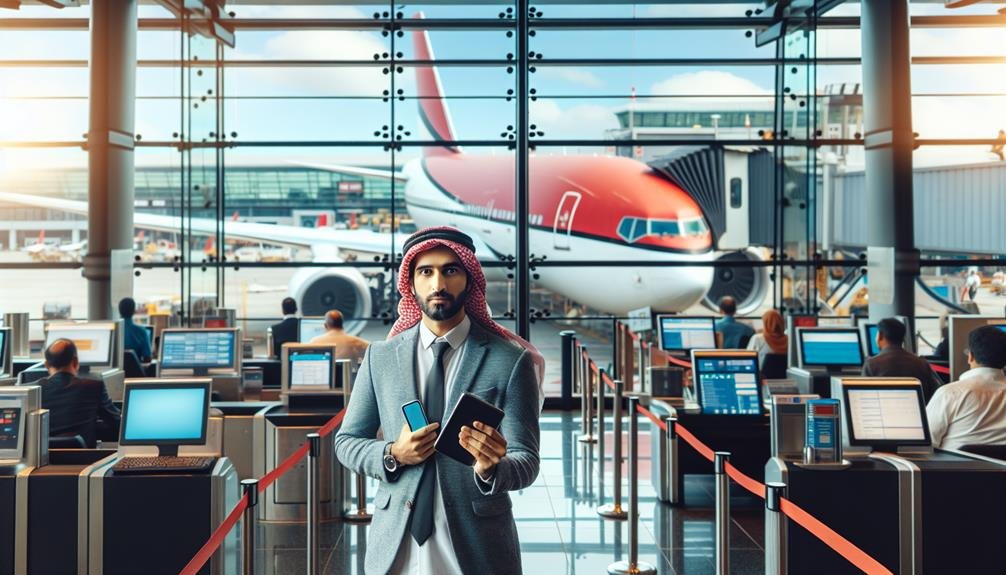Yes, you can bring power banks on Turkish Airlines, but they must be in your carry-on luggage. Make certain your power banks are under 100Wh. If they fall within the range of 100-160Wh, you’ll require the airline’s approval. Anything exceeding 160Wh is not permitted. Keep them easily reachable and never leave them unattended while charging. Avoid utilizing seat-integrated power outlets for power banks. Verify adherence to international safety standards to avoid any problems. If you seek more precise guidelines or safety tips, additional information can offer clarification.
Turkish Airlines’ Battery Policy
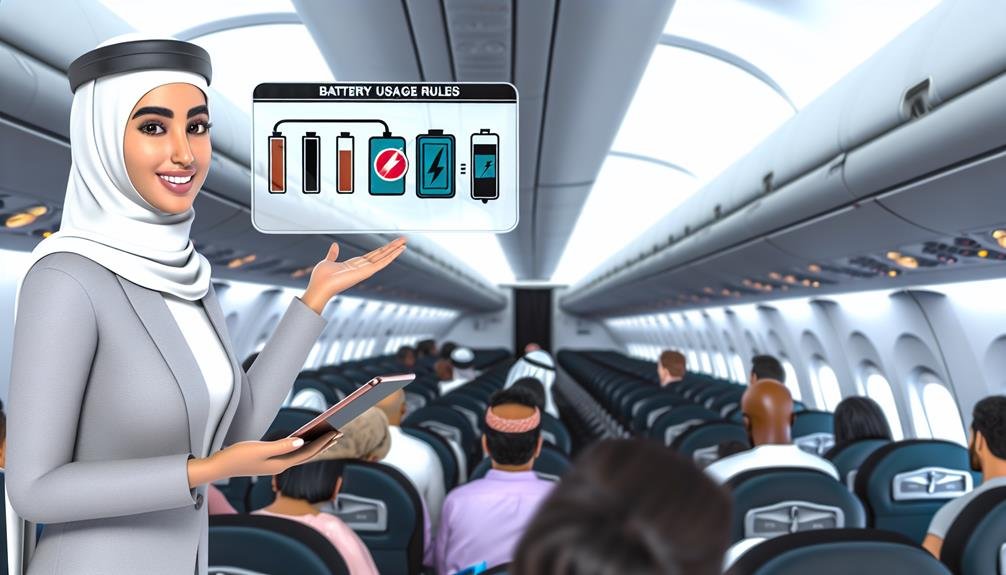
In line with Turkish Airlines’ battery policy, you’re required to carry power banks in your hand luggage rather than checked baggage. This regulation is rooted in safety concerns related to battery capacity and the potential hazards of lithium-ion batteries. By following these guidelines, you significantly reduce the risk of fire incidents that could occur if a power bank were to overheat or short circuit in the cargo hold, where detection and intervention are more challenging.
Airline regulations stipulate that power banks must be readily accessible in the cabin, allowing crew members to swiftly address any safety issues. When preparing for your trip, make sure that all power banks are packed in your carry-on bag. It’s essential to be aware of the battery capacity of your devices. Turkish Airlines, like many other carriers, mandates this precaution to prevent dangerous situations. The International Air Transport Association (IATA) also supports these measures, emphasizing the importance of safety in air travel.
Power Bank Size Limits
When flying with Turkish Airlines, you’re required to follow specific power bank size limits. Power banks must not exceed 100Wh without prior approval, while those between 100-160Wh need airline permission. Always check the capacity and watt-hour ratings printed on your device to guarantee compliance with these regulations.
Capacity Restrictions
Adhering to Turkish Airlines’ regulations, power banks must not exceed a capacity of 100 watt-hours (Wh) without prior approval. This guarantees compliance with voltage requirements and capacity limitations essential for in-flight safety. When you’re preparing to travel, make sure your power bank’s capacity falls within these restrictions. If it exceeds 100 Wh but is under 160 Wh, you may still carry it, but you’ll need explicit permission from the airline.
Turkish Airlines also enforces weight restrictions and charging regulations to further secure passenger safety. It’s important to be aware that power banks must be carried in your carry-on luggage, not checked baggage, as the cabin crew needs to monitor these devices during the flight. The weight of your power bank should be reasonable, ensuring it can be easily managed and doesn’t pose a risk during handling or storage.
Following these guidelines is vital for maintaining a safe travel environment. By adhering to the specified capacity limitations and voltage requirements, you’ll contribute to the security measures in place. Always double-check these restrictions before flying to avoid any inconvenience or potential safety hazards.
Watt-Hour Limits
To guarantee adherence with Turkish Airlines’ regulations, power banks must stick to strict watt-hour limits to secure in-flight safety. The airline regulations set forth specific rules regarding voltage limits and watt-hour restrictions to mitigate any potential hazards associated with lithium-ion batteries. Understanding these guidelines is essential for securing your journey proceeds without any issues.
- Power Banks Below 100Wh: You’re allowed to carry power banks with battery capacities up to 100 watt-hours in your cabin baggage without prior approval. These are typically the most common and widely used portable chargers.
- Power Banks Between 100Wh and 160Wh: If your power bank falls within this range, you must obtain approval from Turkish Airlines before the flight. You’re allowed to bring a maximum of two such power banks per passenger.
- Power Banks Over 160Wh: Power banks exceeding 160 watt-hours are strictly prohibited in both carry-on and checked baggage. These high-capacity batteries pose significant safety risks and don’t comply with the airline’s safety regulations.
Make sure to check the watt-hour rating of your power bank, which is usually indicated on the device or its packaging. Staying within these watt-hour limits will secure compliance with Turkish Airlines’ safety standards and help you avoid any disruptions during your travel.
Lithium-Ion Battery Restrictions
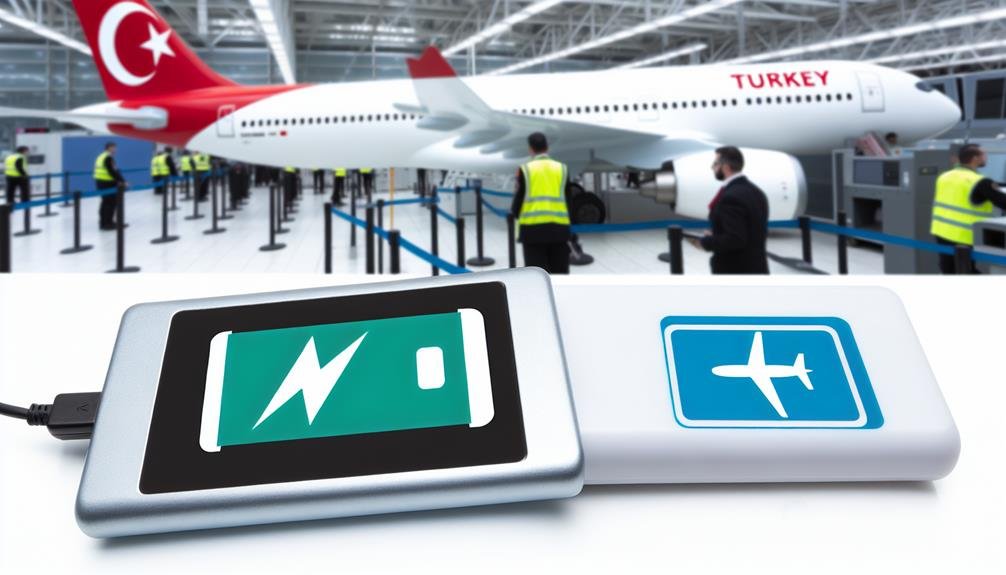
In accordance with international aviation regulations, Turkish Airlines imposes strict limitations on the capacity and quantity of lithium-ion batteries you can carry on their flights. These restrictions are in place to guarantee battery safety and prevent potential hazards. You’re allowed to carry lithium-ion batteries with a capacity of up to 100 watt-hours (Wh) without prior approval. For batteries between 100 Wh and 160 Wh, you must obtain permission from the airline. Batteries exceeding 160 Wh are generally prohibited.
Battery disposal and lithium-ion recycling are critical considerations due to the potential fire risks associated with damaged or improperly stored batteries. Always make sure your batteries are in good condition and are stored correctly to comply with airline regulations.
Turkish Airlines also mandates that spare lithium-ion batteries be individually protected to prevent short circuits. This can be achieved by placing them in their original retail packaging or insulating exposed terminals with tape. Furthermore, you’re limited to carrying no more than two spare batteries exceeding 100 Wh each.
Carry-On or Checked Luggage?
When deciding whether to pack your power banks in carry-on or checked luggage, it’s essential to understand Turkish Airlines’ specific regulations to guarantee compliance and safety. Power bank regulations mandate that these travel essentials, especially those containing lithium-ion batteries, must be carried in your hand luggage. This rule is vital for several reasons.
- Safety Concerns: Power banks can overheat or malfunction, posing a fire risk. Keeping them in the cabin ensures any issues can be quickly addressed by the crew.
- Airport Security: Airport security checks require you to declare all electronic devices with batteries. Packing them in your carry-on makes it easier to comply with these checks.
- Access to Devices: You may need to use your electronic devices during the flight, and having your power bank in your carry-on ensures it’s readily available.
To comply with Turkish Airlines’ power bank regulations, make sure your power banks are within the airline’s allowed watt-hour (Wh) limits. Typically, power banks under 100Wh are permitted without prior approval, while those between 100Wh and 160Wh may require permission. Always check the latest guidelines before you pack to secure a smooth and safe journey.
In-Flight Usage Rules
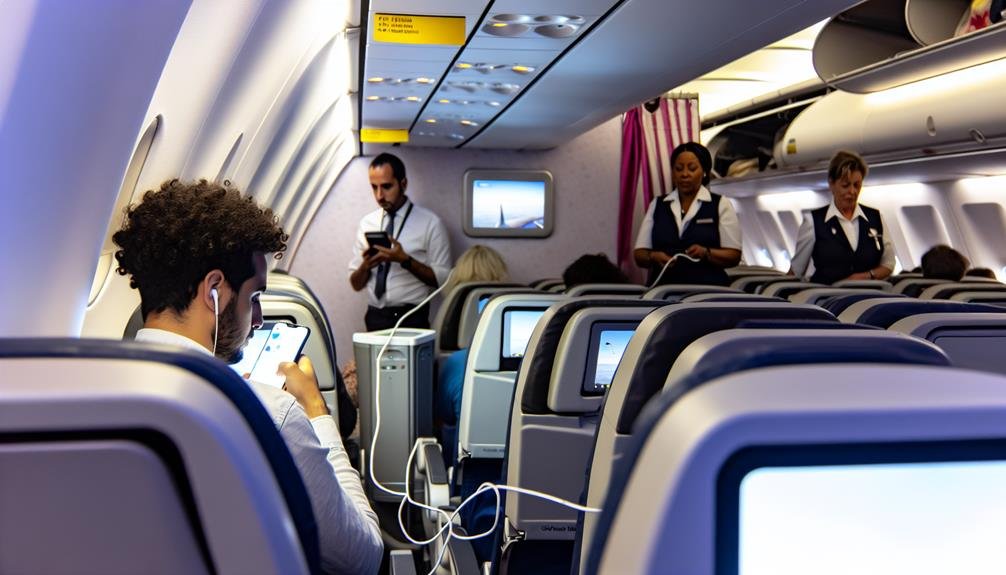
When using power banks on Turkish Airlines flights, you need to be aware of the approved capacity limits to guarantee compliance. Charging your devices onboard is allowed, but it’s important to follow the airline’s guidelines. Storing power banks safely in your carry-on and not in checked luggage is necessary to prevent potential hazards.
Approved Power Bank Capacity
To guarantee compliance with aviation safety regulations, Turkish Airlines permits power banks with a maximum capacity of 100Wh for in-flight usage. This restriction aligns with global airline regulations to secure passenger safety. You should always verify your power bank’s battery capacity before traveling to avoid any inconvenience at the airport.
When considering power banks for your flight, keep the following points in mind:
- Charging Limits: Confirm your power bank falls within the 100Wh limit. Exceeding this capacity could lead to confiscation or denial of boarding.
- Airline Regulations: Always check for any additional airline-specific rules. Turkish Airlines adheres strictly to international standards, so familiarizing yourself with their guidelines is essential.
- Travel Restrictions: Be mindful of the number of power banks you carry. Although the capacity is regulated, carrying multiple high-capacity power banks might draw extra scrutiny from security personnel.
Charging Devices Onboard
Securing your devices are charged during the flight is essential, but Turkish Airlines has specific in-flight usage rules you must follow to safely use power banks onboard. First and foremost, adhere to proper battery charging etiquette by avoiding the use of power banks during takeoff and landing. These critical phases of flight require minimal interference with airplane systems.
When using a power bank, make sure it’s within the approved capacity limits already discussed, and keep it in your carry-on baggage. Turkish Airlines mandates that power banks should not be left unattended while charging to prevent any potential overheating or fire risk. Always monitor your device and disconnect the power bank once charging is complete.
Additionally, be aware of the impact on airplane systems. Power banks should not be connected to seats with integrated power outlets, as this can interfere with the aircraft’s electrical systems. If your device needs charging, use the power bank directly without plugging it into the seat’s power supply.
Storing Power Banks Safely
During your flight, it is crucial to store power banks in your carry-on baggage, making sure they are easily accessible and adhering to Turkish Airlines’ safety regulations. This not only aligns with aviation safety standards but also allows you to charge your devices when needed. Here are some key points to keep in mind for safe power bank storage and usage:
- Proper Placement: Place your power bank in an easy-to-reach area of your carry-on. Avoid placing it near metallic objects or other electronic devices to prevent short circuits.
- Secure Charging: Only charge your devices when necessary and use the airline’s in-seat power outlets if available. Always monitor the charging process to prevent overheating.
- Battery Capacity: Make sure your power bank’s capacity is within the airline’s allowed limits. Typically, power banks under 100Wh are permitted without prior approval.
Charging Devices Onboard
You can typically find USB ports and power outlets available at your seat to charge devices onboard Turkish Airlines flights. Utilizing these power sources effectively plays a crucial role in maintaining a charged device throughout your journey. However, be mindful of charging etiquette: avoid monopolizing shared outlets and make sure your charging cables don’t obstruct aisles or walkways.
In some cases, not all seats have access to power sources, particularly in economy class. It’s crucial to charge your devices before the flight and during layovers. Additionally, use your devices sparingly to conserve battery life when necessary.
In the unlikely event of a power failure at your seat, Turkish Airlines’ crew may provide emergency power sources or guide you to available charging stations within the aircraft. It is vital to follow their instructions to guarantee everyone’s safety and comfort. Remember, you can always use your power bank, provided it complies with airline regulations, as an alternative charging option.
Understanding and adhering to these guidelines plays a pivotal role in ensuring a seamless and safe experience for all passengers. By being considerate and well-prepared, you contribute to a pleasant flight environment.
Safety Precautions
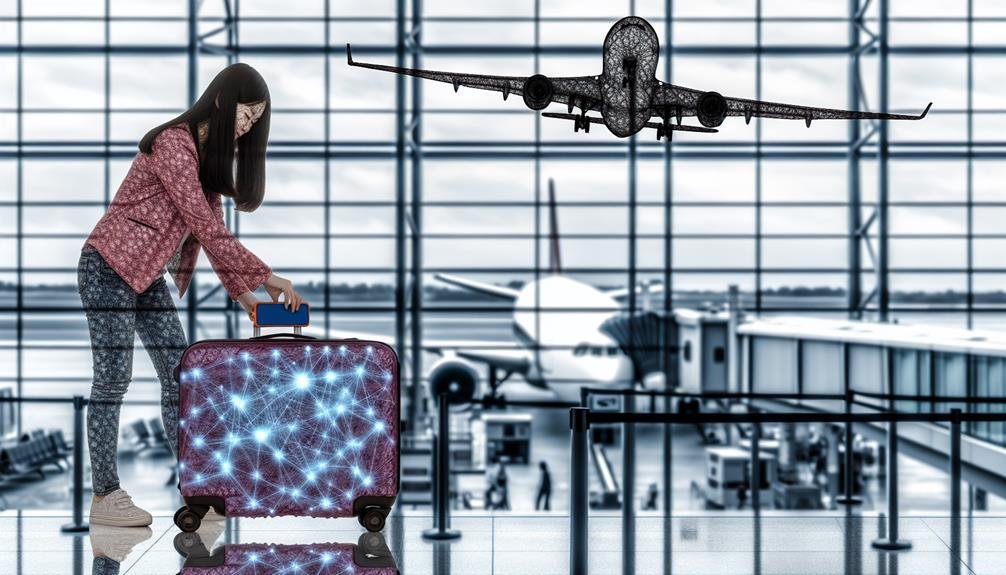
Adhering to safety precautions when using power banks on Turkish Airlines is crucial for preventing potential hazards and guaranteeing compliance with airline regulations. To maintain safety, you must follow strict guidelines regarding charging etiquette and battery maintenance.
Firstly, never charge your power bank during takeoff, landing, or taxiing. This guarantees the device doesn’t interfere with critical flight operations. Here are three key practices to remember:
- Inspect Your Power Bank: Before boarding, thoroughly check your power bank for any signs of damage such as swelling or leakage. Damaged batteries can pose serious safety risks.
- Use Approved Cables: Always use manufacturer-approved charging cables to avoid overheating and short circuits. Faulty cables can lead to fires or other dangerous situations.
- Monitor Charging: If you need to charge your power bank mid-flight, keep a close watch on it. Unattended charging can lead to overheating, which could escalate into a fire hazard.
Proper battery maintenance is equally crucial. Guarantee your power bank is within the airline’s allowed capacity (typically under 100Wh) and store it in your carry-on bag rather than checked luggage. Following these guidelines will help you travel safely and comply with Turkish Airlines’ regulations.
Country-Specific Regulations
You need to be aware that country-specific regulations can greatly impact the use and transportation of power banks on Turkish Airlines. Local aviation restrictions may vary, and it’s important to comply with international safety standards to avoid any complications. Always check the guidelines of both your departure and arrival countries to make sure compliance with their specific regulations.
Local Aviation Restrictions
Finding your way through local aviation restrictions, especially those specific to Turkey, is essential for passengers intending to carry power banks on Turkish Airlines flights. Turkey’s airport security and airline regulations are stringent when it comes to transporting lithium-ion batteries, which are commonly found in power banks. Failing to adhere to these rules can lead to delays, confiscation of items, or even fines.
To guarantee a smooth experience, keep in mind the following key points:
- Battery Capacity Limits: Power banks with a capacity of up to 100Wh are generally allowed in carry-on luggage, but those between 100Wh and 160Wh require airline approval.
- Quantity Restrictions: Passengers can typically carry up to two power banks within the specified capacity range. Exceeding this quantity may not be permitted.
- Prohibited in Checked Luggage: Never pack power banks in your checked luggage, as this is strictly prohibited under Turkish aviation regulations.
Always verify the latest guidelines directly from Turkish Airlines and Turkish airport authorities before you fly. By staying informed and vigilant about airport security and airline regulations, you can secure your journey is both safe and hassle-free. Remember, adhering to these rules isn’t just about compliance—it’s about ensuring everyone’s safety on board.
International Safety Standards
Understanding international safety standards for power banks involves grasping the specific regulations of each country you travel to. With battery safety being a paramount concern, it’s important to know that airline regulations can vary significantly from one nation to another. When flying with Turkish Airlines, for instance, you must adhere not only to their policies but also to the regulations of the countries you’re departing from and arriving in.
Many countries follow guidelines set by international bodies like the International Air Transport Association (IATA) and the International Civil Aviation Organization (ICAO). These guidelines typically mandate that power banks must be carried in carry-on luggage, not checked baggage, due to the risk of overheating and potential fire hazards. Additionally, most regulations stipulate limits on the capacity of lithium-ion batteries, generally capped at 100 Wh, unless specific airline approval is obtained.
It’s important to check the local aviation authority’s guidelines for each country on your itinerary. For instance, the European Union Aviation Safety Agency (EASA) and the Federal Aviation Administration (FAA) in the United States have strict rules that might differ from those in countries across Asia or the Middle East. Always verify to confirm compliance and prioritize battery safety throughout your journey.
Alternatives to Power Banks
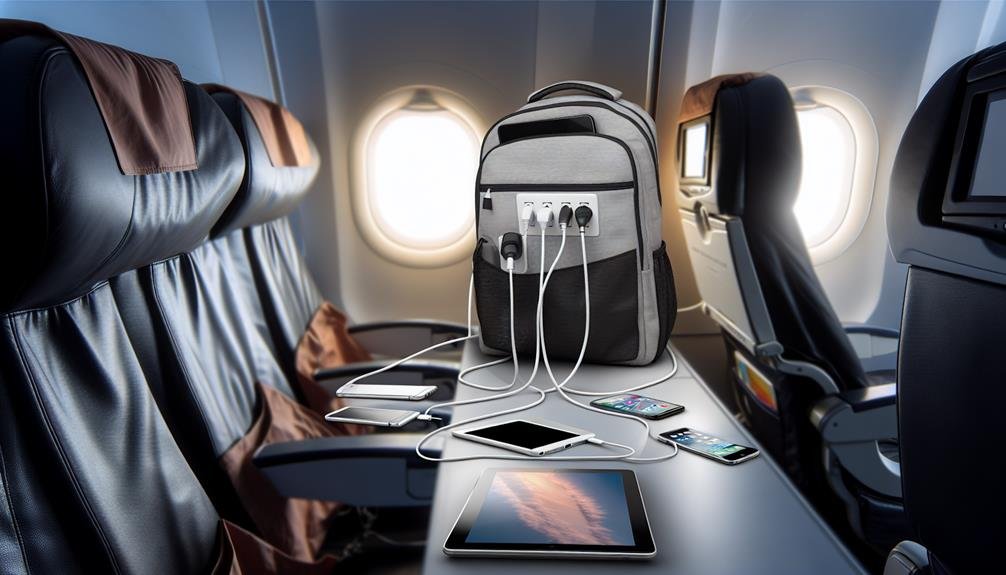
For those seeking alternatives to power banks on Turkish Airlines, utilizing in-flight power outlets and USB ports is a viable option that complies with airline regulations. Many modern aircraft are equipped with these amenities, allowing you to keep your devices charged without the need for a separate power bank.
Consider these safe and compliant alternatives:
- Solar Chargers: If you’re environmentally conscious, solar chargers can be a great option. While they may not be as rapid as traditional chargers, they offer a renewable way to power your devices. Just verify they have a USB C hub for compatibility with various devices.
- Wireless Chargers: Wireless chargers eliminate the need for cables, reducing clutter and potential hazards. Make sure your device is compatible and that the charger is FAA-approved for use on aircraft.
- Portable Generators: While less common, portable generators can be used in emergency situations. However, they must meet strict airline safety regulations. Ensure the generator is compact, lightweight, and approved for air travel.
What to Do If Confiscated
If your power bank is confiscated, promptly inquire with the airline staff about the specific regulations and procedures for retrieving it. Understanding the legal implications is pivotal. Turkish Airlines follows strict guidelines regarding the transport of power banks to guarantee passenger safety. Confiscation usually occurs if the power bank exceeds the allowed capacity or is not packed correctly.
First, ask for a detailed explanation of why the power bank was confiscated. This will help you understand if it’s a regulatory issue or a packing mistake. Once clarified, inquire about the reclaim process. Turkish Airlines may have a protocol in place for you to retrieve your power bank after complying with their regulations.
If the power bank is considered lost baggage, explore compensation options. While compensation policies vary, knowing your rights can facilitate a smoother resolution. Familiarize yourself with Turkish Airlines’ lost baggage claim process to make sure you follow all necessary steps.
Document all interactions and keep receipts or any related paperwork. This documentation is valuable if you need to escalate the issue or seek further compensation. Always prioritize safety and adhere to airline regulations to prevent future incidents.
Frequently Asked Questions
Are There Any Turkish Airlines-Approved Brands for Power Banks?
For Turkish Airlines, there aren’t specific approved brands for power banks. However, you must follow power bank regulations and airline restrictions, ensuring devices are under 100Wh and carried in hand luggage to guarantee safety.
Can I Use My Power Bank in the Airport Lounge?
Oh, you think charging etiquette doesn’t apply in airport lounges? Think again! Make sure your power bank capacity adheres to regulations (under 100Wh) and use designated charging areas to avoid safety hazards. Happy, safe charging!
How Should I Pack My Power Bank in My Carry-On Bag?
When packing your power bank in your carry-on, make sure it’s easily accessible. Follow TSA regulations: keep it in your bag, not in checked luggage. Prioritize safety precautions and travel essentials by using protective cases and avoiding damage.
What Happens if My Power Bank Exceeds the Allowed Watt-Hour Limit?
If your power bank exceeds the allowed watt-hour limit, it won’t meet power bank safety standards set by airline regulations. You’ll need to leave it behind or make alternative shipping arrangements to comply with safety guidelines.
Are There Any Additional Fees for Carrying Power Banks on Turkish Airlines?
Did you know 90% of airlines have specific power bank restrictions? Turkish Airlines’ policies don’t include additional fees for carrying power banks. However, always check their latest guidelines to guarantee compliance with all airline policies for safety.
References
- https://www.turkishairlines.com/en-us/faq/faq-detail/what-is-the-policy-on-carrying-power-banks-into-the-cabin/
- https://www.tsa.gov/travel/security-screening/prohibited-items/power-banks
- https://www.iata.org/en/pressroom/2020/releases/2020-06-02-01/
- https://www.caa.co.uk/Consumers/Travel/Travel-tips/Baggage/
- https://www.cnbc.com/2020/04/15/airlines-revise-rules-on-carrying-lithium-batteries.html
- https://www.faa.gov/hazmat/transporting_lithium_batteries/
- https://www.easa.europa.eu/document-library/general-publications/easa-safety-information-bulletin-2020-01-lithium-battery-transport

